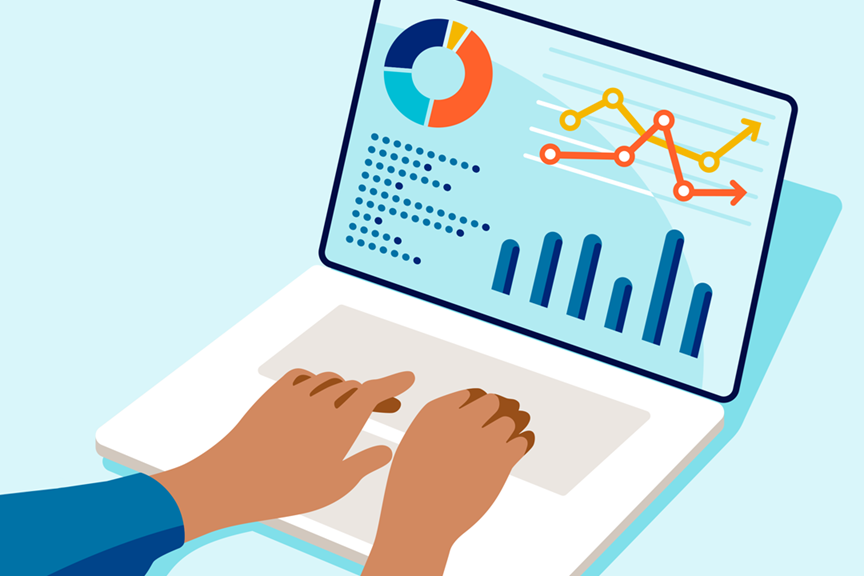In the age of information, business and technology are blurring into one. Gone are the days when businesses relied solely on gut instinct to make decisions – data-driven insights and AI-powered technologies have become a key part of many organisations’ strategies to remain competitive. And that shift has driven the increasing need for talent that can marry business strategy and data technology.
If you’re working as a business analyst, or are considering becoming one, you might be wondering how to break into the rapidly growing fields of data science and AI. The solution commonly begins with a business analyst certification. Not only does such a credential shore up your analysis skills, but it also allows you to flexibly apply your training toward more advanced data and AI applications.
In this article, we’ll discuss how business analyst certifications can take you a step closer to your career in data and AI, what skills you’ll build on the journey, and how these qualifications could be combined with other credentials, such as leadership certifications, in your professional development.
The Widening of the Business Analyst Role
Historically, business analysts (BAs) have been responsible for collecting requirements, handling stakeholders and making certain IT delivered solutions that were aligned with the business. Although those duties are still critical, the role has expanded drastically in the age of data and AI.
The business analyst position of today is expected to:
- Process big data and discover trends and patterns.
- Work with data science teams and AI to influence the CE project.
- And you can use tools like SQL, Python and Tableau to analyse it.
- Distil technical insights into actionable business strategy.
- Auto AI with responsible and compliant outcomes.
It is this evolution that explains why new BAs require skills that are best categorised as data analytics and AI-driven decision-making. A business analyst certification can be a way to formalise this change.
Why Business Analyst Certification Matters
Yes, experience is crucial, but certification, structured learning, credentials and mobility. Here’s why that certification matters to you as a data and AI professional:
Skill Validation
“With a certification, you’re showing potential employers that you’ve mastered not just business basics, but also analytics tools, data interpretation and agile processes,” Mr Johnston said.
Smooth Transition Into Data Careers
Formal programs provide an introduction to data-centric skills such as SQL, visualisation and statistics that will be fundamentals for more advanced analytics and AI positions.
Competitive Advantage
In a competitive job market, having a business analyst certification shows that you’re dedicated to lifelong learning and are prepared for hybrid business-technology roles.
Alignment With Emerging Tech
Many courses have digital transformation, automation and AI adoption modules to prepare you for the challenges ahead.
Gateway to Leadership
Most certifications for leadership allow you to move from individual contributor to team or project lead in data-led organisations.
Skills You Acquire from Business Analyst Certification
A good certification will be far more than requirements gathering. It prepares you for a career in data and AI. Key areas include:
- Analytical Mindset – Strong problem-solving skills in a complex business environment.
- Data Literacy – An understanding of databases, data visualisation software and reporting tools.
- Analysis – Getting to know an introduction to probability, hypothesis testing and regression analysis.
- ThisWeekDebate – About AI – Understanding how AI models function and solve business problems.
- Tools & Technology – Experience with Excel, SQL, Tableau, Power BI, Python or R a plus.
- Agile Methodologies – Leading projects in iterative and collaborative settings.
- Environmental Information Flow – Translating technical findings to business speak.
- Frameworks – How we put structured thinking to use in turning data into strategy.
These are the skills that overlap with entry-level data science, so it will be easier for you to switch.
Career Prospects Once You Are Certified as a Business Analyst
The popularity of data and artificial intelligence means that business analyst certifications offer several paths evolving around these areas:
- Business Data Analyst
Concentrates on parsing through company data to produce something actionable. This role is often the connecting role between business and data science groups. - Data Analyst
More technically focused than a BA position, data analysts are responsible for cleaning, processing and visualising data. With certification, your SQL and BI tool skills can also qualify you to directly enter this role. - AI Business Strategist
A nascent job function whereby individuals assist businesses with pinpointing places where machine learning and AI can be brought to bear on business objectives. - Product Owner/Manager (Data-Driven Products)
When blending business analysis with an understanding of AI, certified professionals can help drive the development of AI-based solutions. - Transition to Data Scientist
For those who work on more training (Python, ML and advanced statistics), Biz analysis can provide a very good platform to move into Data Science kind of roles. - Business Intelligence Specialist
BI tools such as Tableau, Power BI and Qlik are typically used by specialists to create dashboards that help decision makers at the executive level.
Best Business Analyst Certifications to Look for in 2025
If you are serious about leveraging data and AI, then consider these programs:
- Certified Business System Analysis (CBSA) – IIBA
- Certified Business Analysis Professional (CBAP) – IIBA
Advanced credential for experienced BAs.
Writes about strategic analysis and advanced analytics. - PMI Professional in Business Analysis (PMI-PBA), PMI
Note that if you have a bachelor’s degree and a PMP credential or 7,500 hours of leading business analysis experience in the last eight consecutive years, then your requirements for level of education will be proven.
Covers business analysis for project environments.
Comprises agile and data-driven project estimation. - Entry Certificate in Business Analysis (ECBA) – from IIBA
Perfect for beginners, it teaches core concepts and data fundamentals. - Data Science for Business Analysts – Simplilearn (in partnership with IBM)
BA Bridges and some data science skills (enough so if we say Python/ML, you know where to look). - Certified Analytics Professional (CAP)
Industry-recognised, focuses a lot on data analysis, which will be handy. - Google Data Analytics Professional Certificate – Coursera
This seven-month professional online program from Google teaches you all aspects of analysing data, including cleaning and organising it to draw useful insights.
Easy for beginners, focuses on SQL, spreadsheets and charting.
All of these certifications mix the traditional business analysis flavour with a sprinkle of analytics that is required for the data and AI journey.
Leadership Certifications and the Career Path
Clearly, a business analyst certification lays the technical and analytical groundwork, but adding leadership certifications will extend your career over the long term.
Why It Matters:
As companies scale AI efforts, they are looking for leaders who can both build and manage teams as well as drive digital transformation and ensure projects align with corporate objectives.
Favourite Courses:
PMP (Project Management Professional); CSM (Certified ScrumMaster); or one of the executive leadership programs available through universities.
The Edge:
When pairing a degree in BA with an organisational leadership certificate, your career potential opens up to roles such as AI Project Manager, Analytics Director or Chief Data Officer.
This blend turns you not only into a doer but also into a leader who leads organisational adoption of A.I. and data.
How to Move Into Data and AI Careers
If you are a business analyst looking to make this switch, here’s what you can do:
- Begin with Certification – Join a business analyst certification to get hands-on experience with your knowledge and exposure to analytics.
- Learn Technical Fundamentals – Start learning SQL, Excel and visualisation tools. Advance to Python or R if you’re interested in data science.
- Build Hands-On Projects – Work on mock data, create dashboards or contribute to open-source AI projects.
- Connect with Data Teams – Work with data science and AI teams within your company.
- Continue with education – After getting used to the basics, try machine learning, big data or leadership skills and certifications that take you further.
Salary Outlook and Career Growth
BA professionals with data/AI skills are hot. Salaries vary by role:
- Business Data Analyst: $65,000 – $95,000 per year.
- Data Analyst: $70,000 – $100,000 a year.
- AI Strategist: $90,000 – $130,000 per year.
- Analytics Manager: $110,000 – $150,000 per year.
Leadership certifications can also bring additional pay, since managers and directors typically make salaries over $150,000.
What Is the Future of Business Analysts in the AI Age
As AI evolves as a part of business, the duties of analysts will grow even more. Analysts who possess domain excellence, literacy in data and the ability to lead will be earmarked as vital resources.
Business analysts will not be replaced by AI but instead become trusted advisors of responsible organisational adoption, interpretation and ensuring solutions are aligned to strategy.
Conclusion
In 2025 and beyond, the future of the business analyst could be more exciting than ever. Business analyst certification has never been just a credential. Instead, it’s a launchpad into the data and AI careers of tomorrow. With analytical functions, technical abilities, and communication skills, you can go on to be a certified professional (data analyst, artificial-intelligence strategist or BI specialist).
And to ramp things up, accompanying this with qualifications in leadership opens the path to management and executive roles where you will be driving digital transformation initiatives and large-scale AI adoptions.
If you’re eager to move into data and AI jobs, the pet pré of AI careers, the opening step is obvious: get yourself a business analyst certification and place yourself at the heart of AI’s future.





